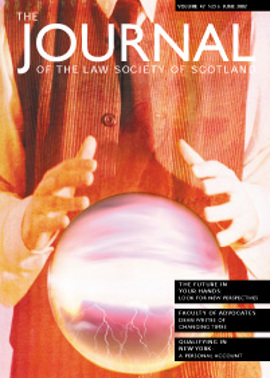Opinion
You really have to ask yourself what is Jeremy Clarkson for; with his Desperate Dan chin and plumbers’ jeans. Well perhaps as a reminder to us girlies of what men were like before the advent of “new man” allowed us to relax our eternal vigilance and start shaving our legs again. Family law practitioners are, of course, well placed to monitor the development of this latest manifestation of homo erectus and, frankly, so far as I can see not much has changed since my (very) old man saw me off the premises in the advanced stages of labour with a cheery wave while patiently explaining to the ambulance crew that he would not be accompanying me to the maternity hospital as he had his work to go to in the morning nor indeed to the ambulance as he was in his slippers.
Despite the deluge of articles in the broadsheets by men who strap their infants to their chests about the joys of fatherhood most of the men we come across have more in common with my Uncle John who nearly saw off his first born by getting up to switch over to the football, pitching his forgotten infant from his lap onto the shag pile. Few men are beating a path to our door begging to be allowed to spend the best years of their lives nurturing two ungrateful brats who will have buggered off to Australia just about the time that you notice the absence of a pension fund. There are exceptions, of course, like the anguished father who instructed us to deploy all the forensic skills available to us to secure residence and delivery of his children from their mother, a rackety creature sorely lacking in domestic skills who seldom sorted her wash and had probably never even heard of a Pledge wipe. Writ, Hearing, Result. Panic stricken father inquires feebly “does this mean I actually have to look after them?”
Despite what our experience seemed to be telling us, family lawyers soldiered on promoting the gender free doctrine of parenthood but now we have the decision of Lord Justice Thorpe, an eminent English Family Judge, in which he states unequivocally that mothers make better parents than fathers. My knowledge of the case is gleaned from the press only but it appears that he, to some extent, based this finding on the fact that women carry, give birth to and feed children. I am not entirely persuaded that gender is determinative of one’s ability to force your lovingly pureed (organic) carrots down your infant’s neck but he is spot on about two out of three, which is not bad for a judge. There has been the predictable response from men who are, like, totally in touch with their feminine side but not a lot from the Radfems who seemed to have missed this landmark judgment which puts them straight back in the kitchen where they belong.
Is it really the case that men’s biological destiny is in the boardroom and women’s in the nappy bucket? Should family lawyers acknowledge, indeed embrace, this simple fact of life and approach contact/residence cases on the assumption that the mother is the natural carer unless demonstrably unfit. That, I think, is where the problem truly lies because if we proceed on the assumption that the mother is the natural primary carer then the only way the father will get residence, even if during the marriage or relationship he has been the primary carer, is by attacking the fitness of the mother. I do not really know if mothers are the natural primary carers but I do know that forcing fathers into the position of bad mouthing the mother will have a catastrophic effect on the children. Surely the least children are entitled to expect is two loving co-operative parents even if they no longer share the same home. Forcing parents to dredge up the past rather than look to the future is hardly likely to contribute to this.
In this issue
- Opinion
- No room for complacency
- The future in your hands
- MDPs: why not?
- A bite out of the Big Apple
- Traps for clients and advisers
- Peer to peer websites – heathen chemistry?
- Legal services through a market lens
- Back on the case
- Website reviews
- Visions of a reasonable observer
- Professional risks – self assessment
- In practice
- Europe
- Plain speaking
- Book reviews






